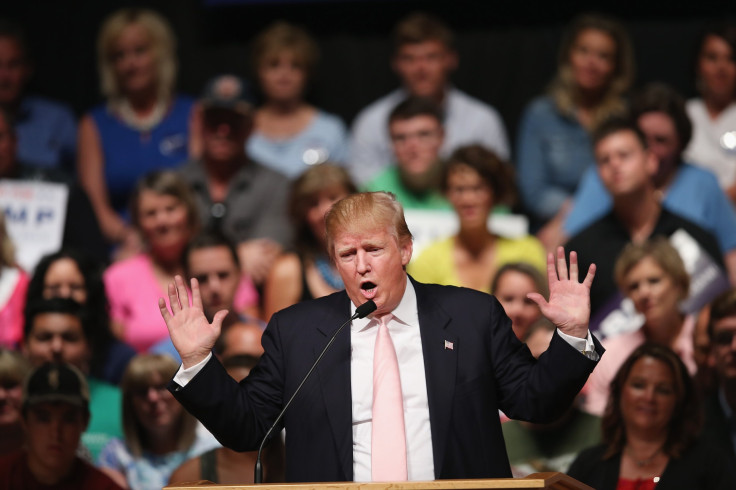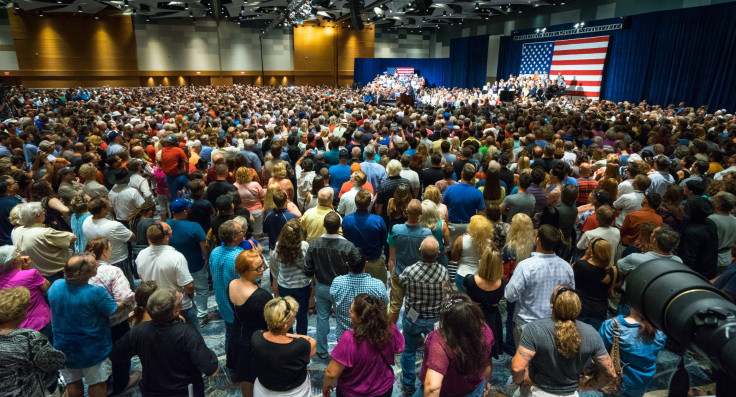Election 2016: Will Donald Trump Fans Abandon GOP If He Isn't The Nominee? The Republican Challenge.

WASHINGTON -- The Republican Party has a Donald Trump problem. But it's not what outrageous thing he could say next or that the maverick mogul might have a realistic chance to win the 2016 nomination. It's that he's become so popular with potential Republican voters, and the GOP has to figure out how it will keep his supporters on board (and energized) when he isn't, ultimately, the party's nominee.
Polls -- like the latest Quinnipiac sounding on Thursday -- continue to put Trump ahead of his GOP rivals. Voters appear to like that he's not polished or politically correct. He's unfiltered, impolitic, and has clearly found a receptive audience, especially for his aggressive criticism of undocumented immigrants.
“Donald Trump is strong,” a New Hampshire supporter told Bloomberg Politics in a focus group conducted this week by Purple Strategies. “He carries a sentiment and frustrations that, I think, a lot of Americans are going through and feeling right now. He's the one that's able to articulate that and bring those frustrations to light. I believe him when he talks.”
So what happens when he loses the primary race -- as he will, when the GOP field starts to narrow and his unfavorability numbers become more significant?
Trump is currently leading in every poll. The Quinnipiac poll found him enjoying 20 percent of the national support, with Wisconsin Gov. Scott Walker at 13 percent and Jeb Bush at 10 percent.
But he’s also leading on another front: 30 percent of those polled said there was “no way” they would ever vote for Trump. And he’s winning that competition by an even larger margin, with New Jersey Gov. Chris Christie a distant second at 15 percent.
“They love him and they hate him. Donald Trump triumphs on the stump so far, but do voters REALLY want him? Maybe not so much,” said Tim Malloy, assistant director of the Quinnipiac University Poll.
That means there is a real ceiling for Trump.
Other candidates may be able to absorb some of his support, but no one else has his combination of flamboyant confidence and outsider cred (to the extent that a billionaire can ever really be considered outside the power structure in America). Arkansas's Mike Huckabee and Texas Sen. Ted Cruz have tried to ingratiate themselves with Trump supporters -- defending the bombastic real estate titan and echoing some of his more controversial remarks. But they’re both career politicians. And neither of them looks likely to be the GOP nominee.

So if the nominee is Bush, Walker or Marco Rubio, the Republican Party is going to have a standard bearer who in many ways is the anti-Trump: open to immigration reform; a longtime politician; a disciplined, cautious campaigner who's unlikely to let loose the kind of can't-believe-he-said-that comments that have put Trump on top of the polls. And that doesn’t bode well for trying to keep GOP voters excited about the fall election.
As candidates drop out of the race -- either before the voting starts or when they start losing key primary states -- the ultimate winner will have to pick up more supporters. Mitt Romney, who like Trump was polling at about 25 percent 16 months before the election, saw his numbers steadily climb. By the time he clinched the nomination in April 2012, he was enjoying support well above 50 percent.
With such a high “no way” rating, it's hard to see how Trump can eventually build up to that level.
But 20 percent of GOP voters -- Trump's current base -- can't be written off. Republican leaders will be desperate to keep them engaged. It's not unprecedented for even the most ardent primary voters to stay home in the general election. Adding to the challenge, a Monmouth University poll in New Hampshire found last week that many of Trump’s supporters are first-time voters and independents -- exactly the people least likely to feel an obligation to turn out and vote for the eventual GOP nominee.
Republicans say they're not worried about enthusiasm for 2016; that the deep and widespread loathing for presumed Dem noninee Hillary Clinton is sure to energize GOP voters. They point to their success in the last two midterm elections, when the party won huge margins in congressional races.
But Romney’s candidacy may offer a warning. The party base felt very little enthusiasm for him. And even though President Barack Obama was as despised by the right as Clinton will be, Romney still couldn’t attract enough support, losing to his Democratic rival by more than 100 electoral college votes .
Teresa Duckworth, 60, of Nashville, Tennessee, said she's a strong supporter of Trump because she agrees "100 percent" with him on immigration and "we are sick of politicians."
"If it came to it and he's not in the picture, I would probably have to go with a Republican," Duckworth said. But she wouldn't be excited about it. "If he's not on the ticket, it would not be a good day."
© Copyright IBTimes 2025. All rights reserved.






















